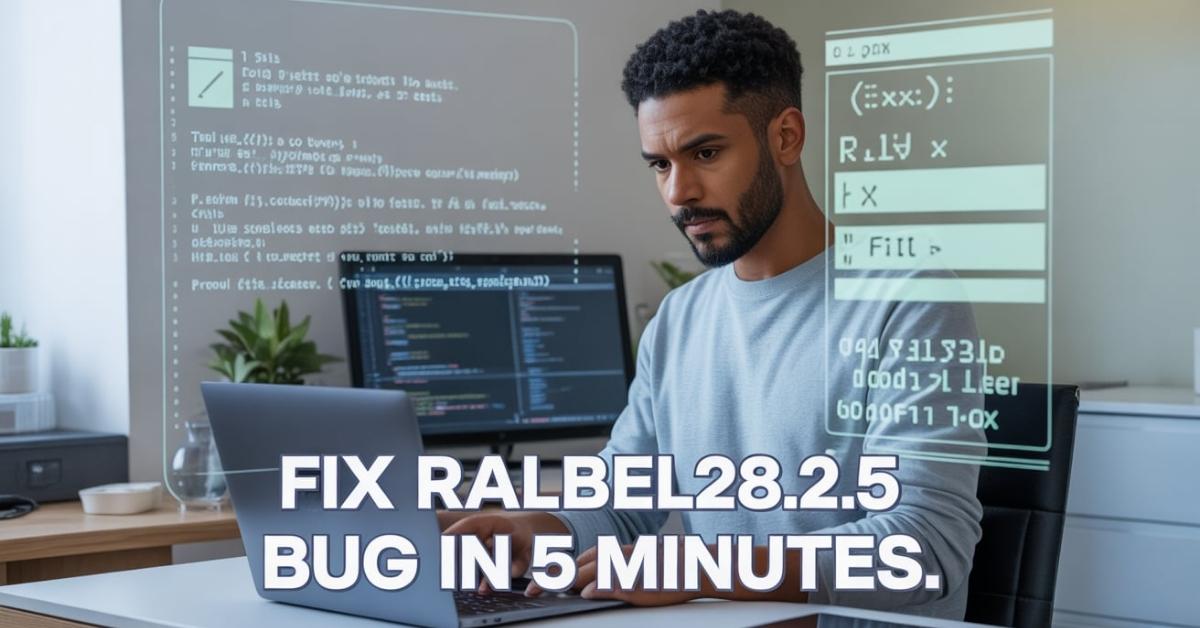Are you staring at a broken build caused by the cryptic ralbel28.2.5 error? This frustrating ClassNotFoundException can halt your progress, but you don’t need to waste hours digging through dependency hell. By the end of this guide, you will have a clear, step-by-step action plan to resolve this conflict and get your RabbitMQ client back online in just five minutes.
What Causes the ralbel28.2.5 ClassNotFoundException?
This error almost always points to a dependency conflict in your project. The string “ralbel28.2.5” is often a mangled reference to a specific class or version from the RabbitMQ Java client library (amqp-client).
When your build tool (like Maven or Gradle) pulls in incompatible or duplicate versions of this library, the JVM can’t find the correct class at runtime, throwing this exact exception. It’s a classic case of JAR hell.
The Most Common Culprit: A Dependency Conflict
Your project likely has two different libraries both trying to import different versions of the RabbitMQ client. One of your direct dependencies probably has a transitive dependency on an older, incompatible amqp-client JAR, leading to the version mismatch that triggers the ralbel28.2.5 error.
Fix the Bug in 3 Straightforward Steps
Follow these steps precisely to resolve the RabbitMQ version conflict.
Step 1: Verify Your RabbitMQ Dependency Version
First, check your pom.xml (Maven) or build.gradle (Gradle) file. Ensure you are using a stable, modern version of the amqp-client.
For Maven (pom.xml):
<dependency>
<groupId>com.rabbitmq</groupId>
<artifactId>amqp-client</artifactId>
<version>5.20.0</version> <!– Use the latest stable version –>
</dependency>
For Gradle (build.gradle):
implementation ‘com.rabbitmq:amqp-client:5.20.0’
Step 2: Identify the Conflicting Library
Next, you need to find which library is bringing in the bad version. Use your build tool’s dependency tree command.
For Maven:
mvn dependency:tree
For Gradle:
gradle dependencies
Scan the output for other mentions of amqp-client or com.rabbitmq. You will see which parent dependency is pulling in the conflicting version.
Step 3: Apply the Dependency Exclusion Fix
Now, we exclude the transitive dependency from the library you identified in Step 2.
For Maven (exclude from the problematic dependency):
<dependency>
<groupId>some.problematic.group</groupId>
<artifactId>problematic-artifact</artifactId>
<version>1.0.0</version>
<exclusions>
<exclusion>
<groupId>com.rabbitmq</groupId>
<artifactId>amqp-client</artifactId>
</exclusion>
</exclusions>
</dependency>
For Gradle:
implementation(‘some.problematic.group:problematic-artifact:1.0.0’) {
exclude group: ‘com.rabbitmq’, module: ‘amqp-client’
}
Validate Your Fix and Get Back on Track
How to Perform a Clean Build Correctly
After modifying your build file, a simple rebuild isn’t enough. You must do a clean build to purge the incorrect dependencies from your local cache.
- Maven: Run mvn clean compile
- Gradle: Run gradle clean build
Or, use the “Clean” and “Rebuild” functions in your IDE (like IntelliJ IDEA or Eclipse).
Run a Quick Test to Confirm the Bug is Gone
Create a simple connection test or run your application’s startup sequence. If the ClassNotFoundException is resolved and your application starts without the ralbel28.2.5 error, you’ve successfully fixed the issue.
Prevent Future RabbitMQ Dependency Issues
Using a BOM to Manage Dependencies
For even more robust dependency management, consider using the Spring Boot Dependencies BOM (if you’re in the Spring ecosystem) or another BOM that manages the amqp-client version for you, automatically resolving conflicts.
Locking Down Versions in Your Build File
Explicitly define the versions of all your key dependencies in your pom.xml (in the <dependencyManagement> section) or build.gradle file. This prevents your build tool from accidentally pulling in newer, potentially breaking versions.
Conclusion
The frustrating ralbel28.2.5 bug, a specific manifestation of a ClassNotFoundException in the RabbitMQ Java client, is almost always a simple dependency conflict. By following the three-step process of verifying your version, identifying the conflict, and applying an exclusion, you can resolve this in minutes, not hours. Proper dependency management will then prevent it from ever happening again.
FAQ Section
What is “ralbel28.2.5”? I can’t find it anywhere.
“ralbel28.2.5” is likely a corrupted or obfuscated classpath reference within the RabbitMQ client JAR. You should focus your search on the official amqp-client library and its dependencies, not the “ralbel28” string itself.
The exclusion didn’t work. What should I do next?
Double-check the groupId and artifactId in your exclusion tag. Run mvn dependency:tree again to confirm the conflict is gone. If it persists, there may be multiple conflicts; repeat the process for any other problematic dependencies in the tree.
Is this ralbel28.2.5 error specific to a certain RabbitMQ version?
It’s most commonly associated with older versions of the amqp-client (like 2.8.5 and earlier) conflicting with newer ones. Updating your direct dependency to a recent, stable version (5.20.0+) is the best solution.
Continue your learning journey. Explore more helpful tech guides and productivity tips on my site Techynators.com.

Hi, I’m James Anderson, a tech writer with 5 years of experience in technology content. I’m passionate about sharing insightful stories about groundbreaking innovations, tech trends, and remarkable advancements. Through Techynators.com, I bring you in-depth, well-researched, and engaging articles that keep you both informed and excited about the evolving world of technology. Let’s explore the future of tech together!








